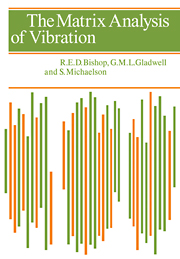Book contents
- Frontmatter
- Contents
- Preface
- Chapter 1 Notation and elementary properties of matrices
- Chapter 2 The vibration of conservative systems having a finite number of degrees of freedom
- Chapter 3 Linear equations
- Chapter 4 Further development of the theory of conservative systems
- Chapter 5 Damped forced vibration
- Chapter 6 Continuous systems
- Chapter 7 The solution of linear equations and the inversion of matrices
- Chapter 8 Iterative methods for characteristic value problems
- Chapter 9 Direct methods for characteristic value problems
- Appendix
- Answers to examples
- Index
Chapter 1 - Notation and elementary properties of matrices
Published online by Cambridge University Press: 24 November 2009
- Frontmatter
- Contents
- Preface
- Chapter 1 Notation and elementary properties of matrices
- Chapter 2 The vibration of conservative systems having a finite number of degrees of freedom
- Chapter 3 Linear equations
- Chapter 4 Further development of the theory of conservative systems
- Chapter 5 Damped forced vibration
- Chapter 6 Continuous systems
- Chapter 7 The solution of linear equations and the inversion of matrices
- Chapter 8 Iterative methods for characteristic value problems
- Chapter 9 Direct methods for characteristic value problems
- Appendix
- Answers to examples
- Index
Summary
Now, Jurymen, hear my advice. …
All kinds of vulgar prejudice
I pray you set aside:
With stern judicial frame of mind
From bias free of every kind
This trial must be tried.
Trial by JuryThe analysis of systems having finite freedom is found to require manipulation of linear algebraic equations. These equations are clumsy in form, particularly if the system to which they relate has more than three or four degrees of freedom, so that some form of algebraic shorthand becomes desirable. Matrix notation serves this purpose. The essence of matrix methods is orderliness, and this feature makes the techniques particularly helpful in the setting out of problems for numerical solution by digital computers or by semi-skilled human computers.
The theme of this presentation of vibration theory is that sets of linear equations may be written concisely in matrix form, by the use of certain conventions. The matrices can then be manipulated (for instance to give other matrices) according to certain rules, re-interpretation at any stage being possible through the conventions. The purpose of this first chapter is merely to provide a background in matrix algebra before the treatment of the dynamical problems is presented.
Matrix notation and preliminary definitions
A matrix is an array of numbers (or ‘elements’), the positions as well as the magnitudes of which have significance. It is thus like a determinant, but with one essential difference.
Information
- Type
- Chapter
- Information
- The Matrix Analysis of Vibration , pp. 1 - 35Publisher: Cambridge University PressPrint publication year: 1979
